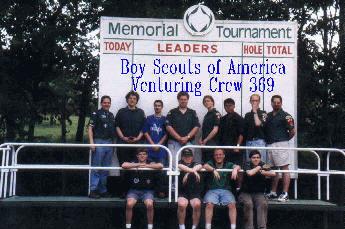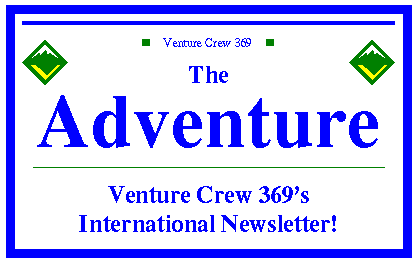(C) Mon May 31 00:57:08 EDT 1999 Venturing Crew 369
|
Our New EquipmentJames D. CorderA special "Thank You" goes out to Richard Schmidt & Richard H. Wooten of AT&T Alanta GA for their kind donation of 3B2 and Sun Equipment. 369 now has the necessary equipment to furnish their new facilities! |
Garage SaleHo-Sheng HsiaoImagine driving a tractor trailer, it doesn't accelerate or brake well. We're in traffic for 3 loads. The back is full of stuff, each time, donated to our Crew for sale the next day. Here we are in this used Chevy Cavalier crawling through highway traffic. Someone donated a car for us to sell Perhaps I should explain. Twice a year, we clean out houses to find stuff we want to get rid of. These kind people (for example, our parents) donate the stuff to the Crew. The Crew then spreads it out in the front lawn of our church, right by Hamilton Rd. People come in, and exchange money for it. This we call our Garage Sale. As we were collecting stuff for our youth VP, Bill Schwanitz. A neighbor heard about it, and donated a TV and a car. Besides the car, we ended up with half a dozen TVs, various radios, bed, chairs, tables, books, trinkets, toys, clothes... people came by and picked them up. What we didn't end up selling, we donated to the nearby goodwill store. Most importantly, though, between planting flowers at Muirfield and staffing the Garage Sale, we bonded as a team. Ask any of the crew members. We are ready to take on new challenges -- such as our Crew Video project. Got stuff to donate? We'll see you at our next Garage Sale, this September. |
Crew Finances
|
Up-an-Coming Crew Expenses12/01/99 Crew Charter $30.00 12/01/99 Crew Insurance $175.00 12/31/99 Registration $335.00 Monthly The Adventure $75.00 Up-an-Coming Member Expenses06/01/99 Summer Camp $175.00 09/01/99 Registration $25.00 |
Why Y2KJames D. CorderHistoricallyAs some of you are aware, I have a UNIX computer collection. Someday I hope to have a UNIX Museum:-) One of the machines that I am most proud of is my "working" Digital PDP8e [Where B became C]! In its day, disk space was abundant, NOT, it has two 2Mb hard drives! Each weights around 300lbs. When I purchased my first UNIX system in the early 1980s the 70Mb eXpansion Box was $17,000US.With such a high cost on disk storage space, every byte saved was worth its electronic weight in gold!!! Simply by shaving the two digit off the year the electric company could save $17,000.00 on running statements by not having to buy extra disk space each month. In the early integrated chips [about the size of your thumb nail] there was less than 1k of space. [Sun Microsystems now puts 2Mb of ram on their chips] This lack of space forced developers to save any where they can. Therefore, they developed chip sets with a two digit year in them. In the 90'sThe most expensive part of any MIS team is the man power followed by the floor space. Therefore, it is easy to justify new equipment. However, the time to re-program a working systems is never on the top of one's priority list.As my Grandfather said: "You get what you paid for!" A leader looks for a solution. A manager looks for a way to stay in budget. Most VPs are paid by increasing the bottom line. Most middle-managers are paid by shaving costs. Most VPs are leaders. Most managers are managers. A VP doesn't care about costs they care about profit. Does the profit out weigh the costs? Most MIS managers are in a cost center. They don't make a profit. They simply cost money. Ok, they are needed. However, their annual bonus is paid on cutting costs. As John Sestina is so fond of saying: "You are not paid what you are worth, you are paid what the job is worth!" Ouch! But True. I charge $175.00 an hour for UNIX work, $125.00 if I am going through a head hunter. Many companies will not pay that since they can get UNIX System Administrators for $35.00 an hour all day long. However, What takes them a week, I can do in a day. Am I worth it, yes! But, most companies do not want to pay their technical staff the same as they are paying their VPs. All of this said, around 1986 it became self apparent that there would be a problem when January 1, 2000 came around. No one cared, it was almost 20 years away. Most managers would be retired by then. Therefore, why chance loosing ones bonus by going over budget on payroll expenses to fix the problem. This budget issue was the major factor until 1998, truly 1999.
Once again, middle-managers kept pushing the software issue to the back burner. Either VPs wouldn't fund it, or they didn't want to give it a higher priority. What would have been a simple fix in 1986 is now near impossible. The US government was given the task to list their "critical" systems and by given dates be x% Y2K compliant. The Department of Defense in order to meet these requirements did not fix the problem. Instead, they removed systems from their "critical" list. Thereby, effectively increasing the percentage of systems now Y2K compliant.(2) The DOD did not lie to America. The numbers are correct. But most technically inept members of the mass media reported the percentages without looking at the factual data: Reported in the Pravda: "In the equestrian competition Russia came in second while America came in next to last!" The Provda failed to report that there were only 2 competitors! |
What happens when Y2K Hits?James D. CorderI do think that this Y2K issue will effect the world. But I don't think it is the end of the world. Nor the basses of the "Second Coming!" I think that America will be one of the better places to be and Russia one of the worst! The southern hemisphere has it the best, it is worm in Australia:-) The biggest threat to the American Way of Life is the imbedded chip! Unfortunately Congress is worried on how this will effect American Consumer Products. Who cares!!! Ok, your toaster, TV, VCR, and microwave has the wrong date. Most VCRs are flashing 12:00 any way. Some PCs will stop function. Get out a pencil and balance your check book on your own. Painful, but you will live. The big problem are the billions of black boxes we forgot are out there. Gas, Water, Electricity, shut off valves. Guidance systems in Air Planes. Alarm Systems... A good thing for most Americans is that when these black boxes don't know what to do, they shut their systems down. The bad thing for cheaply made ones are they stop functioning and leave their systems in the states that they were in when they shut down. Therefore, we will see a loss of power, water, and gas. This will last as long as it takes for the utility workers to remember where these black boxes are located and manually trigger them. Most likely 3 days to a week. The bigger issue, but not life threatening, is the software that was not reprogrammed: Let us say you have money in a bank that is not Y2K compliant. at midnight on the last day of the year, the computer now thinks that it is January 1, 1900 instead of 2000. Therefore, your account has not be active for 100 years and the funds are turned over to the state. In other words, you no longer have a bank account. You purchase Christmas presents on your credit card. The computer now thinks that it is 1/1/1900 and you haven't made a payment in over 100 years. You are charged 21% compounded daily for a century. Did you know that the Earth is not measured in miles but in Degrees, Hours, Minutes, and Seconds. A century later the Earth is in a different location. What happens to GPS? In the year 2000 the 1st falls on a Sunday, in 1900 it was on a Monday. Will the power companies produce far to much power for the world and blow circuits? We don't know! |
Y2K PreparationJames D. CorderY2K preparation is like an insurance policy! I don't plan on getting sick or having a car accident this year. However, I buy insurance just in case! My Grand Father said: "Hope for the best but plan for the worst!" The best in the Y2K scenario is that it will be a simple speed bump in the road of life. The worse case scenario is a year without power or transportation. So at best plan on a week without food, water, or utilities. [no water means no toilets!] In this months issue we will assume a one week stoppage of utilities and facilities.
I think that God will provide. Don't expect the government to come to your aide! This is a global DISASTOR! |
The world is ending?Neil Coplin"The world is ending! The world is ending! Oh my! I'm going to have to stock up on supplies!" This is the thoughts of many Americans on the subject of the Year 2000 Bug. Unfortunately, their thoughts are not entirely accurate to what the effects of this bug are. Cows and other food animals do not run on computers. The Y2K bug will not affect them. We will have a food source. because of this bug. Have you ever seen a cow that runs on a computer? I didn't think so... Even though we all are assuming the worst, it most likely will not happen. When we put our minds to it--humans, businesses, countries, etc.--we can accomplish amazing things. Right now we are worried that we won't finish in time. But we have to realize that companies, as the deadline to the year 2000 comes closer to the present, will start paying programmers more and more money to do it. Extra money provides extra incentive to work more hours, and provides incentive for those who may be holding out for the more money to work. A business could save millions of dollars by spending a few hundred thousand. But would living without our modern conveniences of computers be all that bad? Sure, it would greatly hinder business, make the phone systems shut down almost entirely, something close to crashing the stock market (if not actually doing it), and cause much panic. But humans these days have started taking all of these conveniences for granted. We have started expecting computers to do things for us. While it may be the gift of technology, it slowly deteriorates ourselves. We start losing a life that ancestors lived. We change. So while we all may not like it, it may do us all some good to live a few days in the year 2000 without our conveniences. Maybe this bug is a blessing in disguise... Picture a ProblemHo-Sheng HsiaoI've been told, and I have observed, that tools themselves don't provide a solution. People solve problems. Likewise, tools by themselves don't create problems. The people using the tools create problems. Y2K is not a phenomenon of shortsighted programmers. The problem has more to do with shortsighted people becoming part of the problem. One commonly-cited "problem" resulting from Y2K is runs on banks. People, in anticipating such a run, goes and withdrawals their money. The run, before the anticipation was hypothetical; after the anticipation, it becomes reality. I've just described a self-fulfilling prophecy. The bank itself might be protected against Y2K, the technological shortcoming, but against its customers -- against people -- the bank as vulnerable. Don't get me wrong. There are plenty of hidden places where Y2K will hit. It will be the same when 32-bit UNIX timestamps run over too. Your power grid might go out, causing mass starvation. Or perhaps not. Want more historical examples of technology? The Heindenburg designers didn't see how fire-hazard prone the dirigible's skin and wooden supports were (its demise due to a hydrogen explosion is an urban legend). The Titanic's flaws in high-sulfur iron and lack of navigation hardware made a big mess (and a big movie). Or look at the United States air shuttle blowing up because of fuel seal. Or look at drugs prescribed to help pregnant women turn out to deform fetuses. You can't really fix a deformed fetus. Human tragedy takes patience, healing, and courage. Likewise, human tragedy resulting from Y2K (or mob hysteria over Y2K) will take patience and healing, I'm not advocating losing sight of what's at stake here. Neither should we indulge in allowing hysteria to make the situation worse. |
Why Worry about Y2K?Bill SchwanitzFor quite some time now, we have all been hearing about the Y2K issue. I personally am sick of hearing about it. Many people have some twisted conception that if the computers controlling things like nuclear missile sites will have a problem. If they do, there is a manual over-ride not to mention that it takes (as I know) two keys twisted in sequence to activate them. One other thing that bothers me about Y2K is the whole issue of money. Let's face it. If there seriously is a problem, you will simply see 1900 instead of 2000. All banks which have not successfully converted and are considered Y2K compliant will be shut down, and bought out! Another thing which I find funny that people do not know. We have already passed the first real Y2K date. The 99'th day of the 99'th year. Guess what, we are all still here, no word yet of any problems related to Y2K. News syndicates and the like have shelled out information and raised concerns on issues (also known as propaganda) for the longest time. Companies have sprung up in light of Y2K. It is sorry to say, but our society is living off of the media! I will be curious to see what happens This December. I head from people in the reserves and other military related institutions. From what I have heard from them, they are already "on call" in case there is a run on the banks. This makes sense, but if our economy collapses... What good is paper money or coin money? Things which will be of great value will be food, clothing, medical supplies and other essentials of life. Money would become useless. Considering all of the underlying theories which I have considered, I feel Y2K is not all that serious of a risk. If things go bad, there won't be much I specifically can do about it any ways. I predict as well as hope everything will be fine. Only time will tell. |
Automated MOD to MP3 RecordingHo-Sheng HsiaoBack in the days of Amigas, there's a neat little format called MODs. It played composed music. Take an audio sample. What can one do? Shift the pitch shift the volume, apply reverbs, vibratos, and other sound effects. Then, string a series of these effects into a track, mix several tracks together, and you'd get a song. This is the technology of a MOD -- computer code for music. Today, the audio compression technology, MP3 and its derivative, have pushed MODs from the spotlight. Unlike MODs, MP3s are recordings and much better suited for voice lyrics. MODs cannot handle voice very well. MP3 became more popular than MODs in part because MP3s can record more popular-type of music. Furthermore, MODs have spun off various MOD format. When I say "MODs," I typically mean a /family/ of music formats. There's one standard for MP3s.* I set off on a project to preserve a tie between MP3s and MODs. While MP3 may be more popular, recording and creating MP3s have a higher barrier of entry. With MODs, as with programming, one can be more inventive in creating aesthetically-pleasing music. Hence, I started on a project to hold a MOD repository, and an automated MP3 converter. My hope is that future and present digital musicphiles, in finding the MP3s would be curious and try MOD versions. One in many will download trackers (MOD editors) and perhaps a few will create great music. Also, I am doing this to provide a legitimate source of MP3s. This, despite the RIAA's attempt at smearing MP#s as "pirate-friendly" (though with somewhat-justifiable reasons). The MODs, I downloaded from various archives are freely given -- that is, the musicians were more interested in creating the music and having people hear them. Since the MP3s only convert those MODs, the MP3s themselves are legitimate. There are three main repositories for MODs:, MOD Archive Aminet, and Hornet.org has closed, perhaps due to lack of support. The songs in Hornet are typically competitio entries, hence usually of better quality. the MODArchive.com has an open submission policy, hence tracks found there sometimes aren't worth listening to. Aminet typically has MODs of in-between quality. I estimate around 10 BG worth of MODs for all three repositories. A MOD itself range from 60 kB to nearly 1 MB. That doesn't usually indicate play length, a more important indicator of file size for MP3s. Nevertheless, I estimate that, given an average of 100k for 1 minute, the repositories hold around 100,000 minutes worth of music. MP3 encoding at 128 bits per second takes up about 1 MB per minute. Total conversion would therefore approximate 100 GB of space. On my single, dinky PC using a freeware encoder, it takes 4 minutes to encode 1 MB of raw sound. So to convert MODs to MP3s, we're talking around 400,000 minutes (about 70 days nonstop). I'm not going to sit around 70 days or even 70 seconds in front of a computer with a GUI to drag and drop files for MP3 encoding. Here's where scripting comes in. There are two parts to this automated conversion process. The first part converts MODs to MP3s and manages an input, in-process, and output queue. The second part distributes the conversion to a cluster of machine. This month, I will speak only of the first part of the automation process. I first have to find the basic components of the conversion process. I needed a MOD player that supports a sufficient number of MOD-like format and turn them into raw sound files. Then I needed a software MP3 encoder that takes the raw sound files, and turn them into MP3s. I have a limited budget of time and money. Hence, a quick web-search came up with two freeware packages. Next, I wrote a script to tie it all together. The queues were constructed out of using directories, and having a shell script that polls through a listing with the find command. I chose three directories, "incoming/", "process/" and "outgoing/". The scripts starts by taking a look in "incoming/", and moves it all into "process/". Then it starts converting the files in "process/", leaving "incoming/" open for someone to add more. Each finished MP3 goes into "outgoing/" until the script has finished everything in the "process/" queue. The script then repeats again moving things from the "incoming/" queue to the "outgoing/" queue. The reasoning behind setting up such queues is in its future use in a cluster. This allows nodes to keep track which files have recently been uploaded for processing, and which needs to download back to the root computer of the cluster. As usual, there are caveats to this script. There are no error handling. If a conversion fails, it won't fail gracefully. Also, I should modularized the script to allow different applications. This allows a single cluster to quickly reconfigure into another application requiring a cluster. Check out a space on my Crew369 web site later focusing on this application. |
Microsoft probes Unix territoryBob Brewin antenna@fcw.comReprinted here with permission of FCW Government Technology Group. MAY 10, 1999 The Army's concerns about Windows NT messaging security in the battlefield push Microsoft to develop a Unix-based e-mail client Microsoft Corp., making an unprecedented foray into Sun Microsystems Inc. territory, is scrambling to put together a Unix version of its messaging software after being shut out of the Army's strategic program for deploying commercial hardware and software to the battlefield. The Army has chosen to base its Army Battle Command System (ABCS) on secure messaging software from Lotus Development Corp. running on Sun's Solaris, a Unix operating system, because of security concerns the Army has with Microsoft's Exchange messaging software and Windows NT operating system. ABCS workstations provide the core computing platform for the Army's Force XXI initiative, which aims to field commercial networks, computers and other technology in the battlefield to enable soldiers to access information on troop location and strength, logistics support and other command and control data. As a result of the Army's decision, Microsoft is working with a third company to develop a Unix client of Exchange to support the Defense Department's secure Defense Message System (DMS) program, said Mary Ellen O'Brien, director of DOD sales for Microsoft Federal. Microsoft is concerned that the Army's choice of Lotus Notes for the battlefield would erode support for Exchange at Army posts, O'Brien said. "That's why we're addressing the issue," she said. O'Brien declined to identify the company developing the Unix client and did not say when Microsoft expected to field the product. The Army decided to choose Lotus software over Exchange because security is such a concern in the battlefield, said Terry Edwards, director of the Force XXI Technical Integration Center at Fort Hood, Texas, where Force XXI systems are being developed and tested by the 4th Infantry Division, the Army's first "digitized division." Because much of the message traffic in a digitized division will use wireless transmission, Edwards said, "security becomes a paramount issue." He said that the secure, DMS version of Lotus Notes running on Solaris "provides us with better security" than a Microsoft solution. He added that "Lotus Notes is a far more technically superior product." Industry analysts see the development of a Unix/Exchange client as a big step for Microsoft. "I think that Microsoft might finally be growing up," said Dan Kuznetsky, an analyst at International Data Corp. "They are realizing that if they want to be a good corporation, they have to be a good partner." Microsoft's strategy is to get into the high-end, enterprise market. To do that the company has to be able to work with the software and hardware that already is in place, Kuznetsky said. "Microsoft, from a broader perspective, is facing a significant challenge to [its] approach," he said. "[Microsoft has] to start embracing solutions that are already in the environment." The Army also has decided to go with the Solaris operating system despite choosing to switch some users to workstations based on Intel Corp. processors rather than the reduced instruction-set computer chips that usually run Sun workstations. While the change in hardware could have dictated a switch to Microsoft's Windows NT operating system, Edwards told FCW in an interview at Fort Hood that the Army has decided to stick with Sun technology -- specifically the Solaris x86 software designed to run on Intel platforms -- for the same security reasons. "[Windows] NT cannot support our security requirements," he said. The decision to go with Sun, even though Intel processors usually mean going with Windows NT, is not all that surprising, analysts said. "Sun certainly has a long, successful track record of dealing in secure environments," Kuznetsky said. "If I was running a secure environment, I would be very concerned about the stories I've been seeing about security problems in [Microsoft's] Internet Explorer, Exchange and [Windows] NT." Col. Robert Raiford, director of the Army's DMS program office, said, "The combination of Lotus with DMS [on] the Solaris operating system provides us with the best solutions for the ABCS tactical warfighter. This solution is optimized for the mobile users, enabling soldiers to easily receive and send high-security messages." Edwards added that the Army's Force XXI project stands ready to evaluate and deploy competing products from Microsoft "if they can provide the capabilities we need." Charles Cephas, a solutions architect for Microsoft Federal, said the company provides highly reliable security "out of the box.... Policywise, you have to make sure you configure it correctly." Jere Caroll, manager of Army operations at Sun Federal, said, "This is a big deal.... It's a nose under [Microsoft's] tent." |
Memorial TournamentHo-Sheng HsiaoThis year, Venturing Crew 369 went to Muirfield in force to plant flowers for Columbus's annual Memorial Golf Tournament. Over two days, we planted over 5,000 flowers on three holes. On our first day, our crew planted the flowers on Muirfield's signature hole, hole 12. Between the rest of the first day and the second day, we finished planting flowers on holes 15 and 5. We are looking forward to planting the flowers next year, as this event will become part of the regular calender. 
Back LineJames D. Corder, Joe Prinz, Dave Scruby, Bill Schwanitz, Alexander Gilly,Ho-Sheng Hsiao, Nathaniel P. Graham, S. Potter Front LineJames J. Scherer, Neil A. Coplin, Jack Trout, Thomas R. Lowers,Muirfield Memorial Tournament
|
Oh my aching back!Neil CoplinTwo days straight of planting, planting, planting. If I had to guess, I'd say that I planted about 500 flowers alone. Just part of the over 5000 flowers that the crew planted though. It was a blast though. It was the second time that I had ever been to that golf course and I was glad to be back. It's so beautiful there. Of course, the beauty after this weekend is partly due to the efforts of the crew. We planted flowers on three of the eighteen holes on the course. We began with hole 12, the signature hole of the course. (A very lovely hole that I wanted to attempt the whole time we were sitting there planting flowers) Being the first hole that we were planting, we weren't quite in the swing of things yet. The fact that we were planting on a 45 degree slope didn't help much. Of course, the slope we planted on that day was just a beginner course as to what was to come. After running from the rain that kept pouring down during the day, we finally finished the hole. It was then onto 15. Here, we had an even steeper slope. Since we knew that we were not going to finish the hole before the day's end, we had almost decided that we would bring in some repelling gear and use it to plant the flowers the next day. We didn't bring any of it the next day, but I'm sure that it would have helped. The defining moment of planting flowers on 15 was the torrential downpour that happened at the end of the first day. Actually, it's what made us call it a day. (Even though it stopped as soon as we were on our way out though) The last of the three holes that we planted was hole 5. The surface here was much like that of 12, with one exception. It was bigger. We were all tired and sore by now, but our spirits maintained and pulled us through. Our temporary (until we get an official position) morale officer Joe Prinz kept us going. We all had a lot of fun. Now there is no more planting that we will do. It is time to sit back and watch the Memorial Tournament to see all of our handiwork. Oh yeah, and watch the golf too... |
Congratulations 369James D. CorderAt the 1998-1999 Exploring/Venturing Awards Banquette the top 50 members were in attendance. World Renowned Financial Planner John E. Sestina gave an inspiring presentation on the many facets of wealth. Love-Wealth, Family-Wealth, Friendship-Wealth, and of course Money-Wealth. I was impressed at his ability to speak to such a diverse audience while simultaneously captivating them all! Venturing Crew 369 was presented with the "Post Service Project of the Year" for their continuing efforts with the St. Stephens Food drive where over 2,000 families where provided with groceries for the month of December, over 5,000 children received toys for Christmas, the maintenance of an abandoned 1812 grave yard, services to the Center of Science and Industry, and being the only Scouting Unit to be invited to give a presentation to the Junior Achievement Young Entrepreneur Fair. 369's Associate Advisor, Andrew P. Drake was the 35 recipient of the "Explorer Hall of Fame Award" in Scouting's History for his 10 years continues service to the Scouting Movement. Mr. Drake is a 1994 recipient of the Bronze Big Horn Award, Past Governor's Aide, Member of the Exploring Committee, Member of the Venturing Committee... Your's truly is the fourth recipient of the "William H. Spurgeon III Award" in Ohio. |

John E. Sestina |
Our New RoomJames D. CorderThe blue prints for Venturing Crew 369's new facilities are currently at the City of Columbus for permits. We hope that we will get a permit in June and start building in July! With new classes beginning in September, it would be nice to have them in our new facilities. If you know high school students that would like to learn UNIX, have them contact us at: exp369@www.venturingbsa.com Quote of the MonthPatience, Galatians 6:9And let us not be weary in well doing: for in due season we shall reap, if we faint not. The room is coming:-) Footnotes |
This page has been accessed $pagecount"; ?> times. Since Mon May 31 00:57:48 EDT 1999

 Preparing for Y2K!
Preparing for Y2K!






